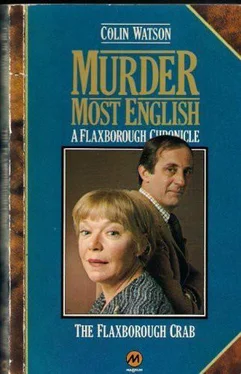“It was the way he ran,” she said. “I’ve never seen anything quite like it before. You know how soldiers shuffle along to one side when they are doing drill—closing ranks, do they call it? Anyway, it was rather like that, only much, much faster and with bigger steps, of course. He was actually running sideways, if you can imagine such a thing.”
“What, like a crab?”
“That’s it exactly. Like a crab. Now isn’t that odd?”
“Most decidedly,” said Purbright.
Chapter Two
Unlike Miss Butters, nineteen years old Brenda Sweeting, shop assistant, considered sexual molestation to be a permanent and universal hazard.
This view derived partly from her mother’s admonition, repeated every day in life, to “watch your step and mind who you talk to”; partly from a certain freedom of gesture and remark that characterized the young Flaxborough male; but chiefly from the traumatic experience in early childhood of hearing auntie command: “Don’t pick those flowers, dear: the dickybirds have wee-wee’d on them.”
In a world where even birds had villainous habits and the very flowers were impure, it was obvious to Brenda that merely human virginity was at a pretty sharp discount.
She knew what to expect, therefore, when an arm reached out from a bush-enshrouded driveway on Heston Lane and closed round her waist.
The time was half-past ten and Brenda was on her way home after spending the evening with a girl friend. Heston Lane was not the shortest route she could have chosen, but it was the best lighted and an occasional bus passed along it. Moreover, the Heston Lane residents were reputed to be of good financial standing, and this quality was näively equated in Brenda’s mind with aloofness from lust.
Almost before the arm touched her, she screamed. The scream had been on a hair trigger, so to speak, and it went off at full charge. She twisted, tugged, flailed and kicked. Then she screamed again. But the arm held fast.
Not a door opened in Heston Lane. Those occupants who heard Brenda’s cries were accustomed, unfortunately for her, to associating such sounds with the boisterous enjoyment of the lower classes. They winced disapprovingly, and hoped the rhododendrons were not taking too bad a beating.
The point at which Brenda had been waylaid was exactly midway between two street lamps and fairly dark in consequence but she managed to resist the man’s efforts to drag her into the even deeper obscurity of the driveway from which he had emerged.
A third scream brought no sign of rescue, so she concentrated her energy into wrenching herself nearer the light. Kicks were now more painful to her than to their target, as both shoes had fallen off, so she used her knees instead.
One luckily placed blow earned a sharp wail of distress and she gained another three yards towards the lamp. But still she could not break free of the encircling arm.
With his other hand the man was warding off the punches that Brenda repeatedly but not very effectually directed towards his lowered, always averted, face. At last he caught and held her wrist.
His grip on her flesh was dry and bony. It frightened her more than anything else that had happened to her so far. She knew that the grip was not very strong. Yet she could not tug her wrist away. The sudden revelation of her own spent strength was a horror that buckled her and laid her sobbing and slack across the arm she had been fighting to escape.
The man stood there, hesitant. He seemed bewildered by the collapse of the girl’s resistance. Several seconds went by before he started, his attention caught by the approach of a car from the direction of the town.
He grasped Brenda close in both arms and began half-carrying, half-dragging her back to the driveway.
The car, travelling fast, was only two or three hundred yards distant. The note of its engine changed. Brenda felt her captor’s effort increase. He was taking great gulps of breath as he heaved her like a too-heavy sack. The twigs of a bush raked across her face.
It was only then that the noise of the car broke into her consciousness. She opened her eyes a little. The hot, thick tears transmuted the headlamps’ glare into a jumbled constellation of bright silver orbs, but she knew that they signified the possibility of deliverance. She strained towards the light and threw into it one last retching scream.
She was alone, free of the grappling, claw-like hands and of the rasping breath that had smelled unpleasantly of cigarette-ends and cough medicine. She knelt, head bowed, and was grateful for the feel of cold asphalt through her torn stockings.
Somewhere a car door slammed. There was a shout, a scuffling of feet.
Brenda looked about her wonderingly.
The car, its lights still ablaze, was across the pavement a few yards away, angled ready to enter the drive of one of the houses. Running away from the car were two men, pursued and pursuer. Brenda watched them cross the road and pass through the pool of light cast by the nearest street lamp.
She thought the first man was going to fall over. He had turned as he ran and was now scuttling along sideways, his legs all over the place.
The girl giggled, then at once began to cry again. She saw one of her shoes lying in the road. She bent over and picked it up.
When she caught sight of the two men again, they were almost directly beneath the next street lamp. One had grabbed the other’s arm and was pulling him to a halt. Brenda felt pleased that her attacker had been caught. Now he would be punished. At the same time, her terror was renewed at the thought of having him once again in close proximity, even under the guard of policemen.
She turned away and limped painfully towards the car, searching the ground for her other shoe. When she found it, she saw with a new stab of distress that it was broken, ruined. She thought of the impending disapproval of her mother and hated the old man even more.
Old. That he was old, it had not occurred to her to doubt. He had felt and smelled old. The girl shuddered and carefully eased on the broken shoe while she supported herself against the car.
Someone was crossing the road towards her. She looked up. The owner of the car, the old man’s pursuer. But he was alone.
“Now, young lady.”
He was a man she had seen before several times, here and there in the town; tall, quite handsome, self-possessed; not young, though. He looked well off.
Her gaze slipped past him into the dark and became a stare of alarm.
“Where is he?”
The man shrugged elegantly. “I’m afraid he got away.” He saw her expression. “You’re quite safe now, though. Don’t worry. Just let me take the car in and we’ll have a look at you in the house.”
She knew now who he was. Doctor Meadow. Quite a posh doctor. Her friend Sylvia Bart was one of his patients. Yes, but...
“But he can’t have! That old man. Got away, I mean. You had hold of him.”
“I’m afraid he did, though. Look—keep close to the car and I’ll see you at the front door. Then I’ll drive you home again afterwards.”
The house was very grand. As the doctor led her through a panelled hall with thick carpet on the floor, he switched on one light after another and left them burning even after they had passed into a side room and through that to a much bigger one with long crimson velvet curtains draping a window the size of a cinema screen. In this room, Brenda counted eight separate lamps. Five were set in the walls behind pink silk shades, gold-braided. The other three were huge standard lamps, taller than herself. Her feet sank into carpet as thick as a sheep’s fleece and of the colour of very milky coffee. The four armchairs and two settees were every bit as splendid looking, in their livery of pale cerise damask, as those in the new Odeon foyer had been when it was first re-opened for Bingo.
Читать дальше












